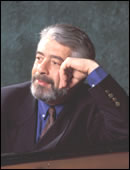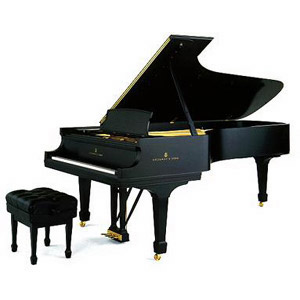Professor's Wednesday Piano Recital Features Transcriptions and Works of Bach, Mozart and Stravinsky
March 3, 2006
 March 3, 2006, Greencastle, Ind. - Claude Cymerman, pianist and professor in the DePauw University School of Music, will perform a solo recital on Wednesday, March 8 at 7:30 p.m. in Thompson Recital Hall. The event, which is free and open to the public, will feature works by Mozart, transcriptions of several pieces by J.S. Bach as well as Professor Cymerman's own transcription of Igor Stravinsky's notorious Rite of Spring.
March 3, 2006, Greencastle, Ind. - Claude Cymerman, pianist and professor in the DePauw University School of Music, will perform a solo recital on Wednesday, March 8 at 7:30 p.m. in Thompson Recital Hall. The event, which is free and open to the public, will feature works by Mozart, transcriptions of several pieces by J.S. Bach as well as Professor Cymerman's own transcription of Igor Stravinsky's notorious Rite of Spring.
The evening program will begin with Wolfgang Amadeus Mozart's Fantasy in D minor, celebrating the composer's 250th birthday and inexplicable genius. The remainder of the program will focus on the genre of the piano transcription, an art form celebrated over the years by countless piano virtuosos. Included in this segment of the program will be Italian piano virituoso Ferrucio Busoni's transcription of J.S.  Bach's "Intermezzo" from Toccata in C major for Organ as well as Leopold Godowsky's transcription the master's "Andante" from the Second Sonata for Solo Violin. The final Bach work of this set is French pianist and composer Marcel Mercier’s arrangement of the choral In Frieden Weiden die Schäfe."
Bach's "Intermezzo" from Toccata in C major for Organ as well as Leopold Godowsky's transcription the master's "Andante" from the Second Sonata for Solo Violin. The final Bach work of this set is French pianist and composer Marcel Mercier’s arrangement of the choral In Frieden Weiden die Schäfe."
"Marcel Mercier was my first piano teacher in my native town of Metz, France," says Cymerman of the work's inclusion. "Not only was he a wonderful pianist and composer, but also an accomplished philosopher, organist, humorist, humanist and pedagogue."
Closing the concert will be Cymerman's own transcription of music from Igor Stravinsky's Le Sacre du Printemps (The Rite of Spring). The ballet's premiere in 1913 at Paris' Théatre des Champs-Elysées caused one of the biggest musical scandals of the 20th century when a riot erupted during the performance due to the work's erotic choreography, primal rhythms and challenging harmonic language. For the recital, Cymerman will present his transcriptions of Part I: Adoration of the Earth and Part II: The Sacrifice.
"My transcription of Stravinsky's Rite of Spring has evolved for nearly 25 years, beginning with my exposure to and performances of the composer's original 2-piano version," says Cymerman of his relationship with the work. "I view the transcription as a sort of X-ray of the orchestral score. While it is impossible to recreate all of the textures and sounds produced by orchestra on the piano, the piano transcription gives a sort of 'black and white' image of the work, clarifying and distinguishing thick textures."
Visit the DePauw University School of Music online by clicking here.
Back